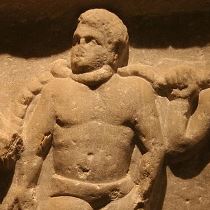
Despite being a god, Jesus is unaccountably never able to speak for himself. For better or worse, he has his friends to defend his good name (in this case, it’s for worse). The seven points we’ve analyzed so far from Christian apologist Tom Gilson have been full of holes (part 1 here). Here are the final three.
[EDIT: Gilson wrote a second post in response. Find the link at the bottom of post 2.]
8. Bible slavery was nothing like American slavery
“Slavery was absolutely woven into the economy and culture of the day. It was nothing like southern chattel slavery, of course. If you’re thinking slavery in 1830s Alabama, you’re not thinking of slavery in first century Greco-Roman or Judaic culture.”
No, I’m thinking about slavery as sanctioned by God in the Old Testament. If morality isn’t relative, as Christian apologists insist, God’s rules about slavery should always be in vogue, whether given 3000 years ago or yesterday.
Let’s have a quiz. To compare biblical and American slavery, we’ll take Gilson’s claim as a challenge. I’ll paraphrase two slave laws. One is from Alabama from the 1830s and the other from the Old Testament. See if you can tell which is which.
Law 1: If, through abuse, a slave owner dismembers or kills a slave, that slave owner shall be punished as if he had committed the same offense on a free person.
Law 2: A slave owner is assumed to treat his property responsibly, and that includes beating as may be necessary. A beating shall be considered abuse only if the slave dies or is unable to return to work within two days.
(The sources of these two laws are given at the end of this post.*)
Gilson said, “[Slavery as prescribed in the Bible] was nothing like southern chattel slavery, of course.”
Wrong. American slavery and biblical slavery were pretty much identical. I make that comparison here.
If slavery improved in first-century Judea as compared to Old Testament times, I would like to see evidence that it was due to Judaism. “Well, yeah, they had slavery in Palestine, but it wasn’t that bad” is hardly a bold endorsement of God’s society on earth. I think it’s fair to insist on high moral standards for the Creator of the universe.
(This is where apologists will point to The Fall® and say that society’s problems are all mankind’s fault. (1) This argument fails, and (2) blaming it all on people is exactly what you’d say if you were stuck defending a god who didn’t exist.)
The god who spoke the universe into existence could probably find a solution to slavery. As usual, Christians have their god running from opportunities to show he exists.
9. You underestimate how entrenched slavery was
“[Slavery] was embedded in the social structure, so deep that you must realize there’s no way anyone could have just ended slavery. The Greeks, Romans, and Jews had no conception of widespread voluntary employment. There’s no chance that Jesus or anyone could have instituted it overnight. They’d have been slaughtered for trying.”
Remind me sometime to explain what “omnipotent” means.
God is (supposedly) magic. If God wanted slavery gone tomorrow, he could make that so.
And don’t tell me that slavery is part of God’s marvelous plan. Whatever God expects to achieve through abysmal living conditions, he could achieve with magic. And the existence of slavery has a straightforward natural explanation. The God hypothesis adds nothing.
What sounds more likely—God dictating the rules of slavery in the Old Testament and letting it persist through history or “God” being a human invention, just like all the other gods?
10. Jesus did end slavery, just not right away
“What was needed was a revolution of the heart, which [Jesus] led, and then the gradual development of economic and social structures to fill the place slavery had held. It resulted over time in the ending of slavery in Europe; and in fact, there is no place on earth where slavery was abolished except under the influence of Jesus Christ.”
There are more slaves today than ever! “Revolution of the Heart” might work as the title of a pop song, but it’s just handwaving to imagine it having changed the world. The Ten Commandments, purportedly from God himself, banned lying, stealing, or murder almost 3000 years ago. How did that revolution work out?
Why focus on just slaves in Europe when Jesus’s “revolution” was for the whole world? But let’s ignore that and focus on the claim that there are no slaves in Europe. The 2018 Global Slavery Index says that today there are more than 10,000 slaves each in Sweden, Switzerland, Austria, Belgium, Portugal, Greece, and the Netherlands. And more than 100,000 in France, Spain, Italy, Germany, and the UK.
Data on France says that most of its slaves are prostitutes, with domestic work being the second largest category. Additionally, France annually imports $15 billion in products at risk of being produced by forced labor. Germany has similar numbers—90% of its slaves are prostitutes and $30 billion in imports are possibly produced by forced labor.
Gilson tells us that it pleased God to handle this humanitarian crisis in a gradual manner. No need to rush in headlong and eliminate vast amounts of human suffering all at once, right? Jesus couldn’t just end slavery but had to work through William Wilberforce (a Christian) to end the slave trade in the British Empire in 1807 and slavery itself in 1833.
And Jesus also worked through France’s very atheistic Revolutionary government to end slavery there in 1794. And haphazardly through other countries throughout history, I guess. (How frustrating it must be to be omnipotent and yet constrained by inept humans.)
Who’s responsible—Christians or Christianity?
It is maddening to find Christian apologists who claim their god can do anything but then must explain how God stepped back when any of us with that power would’ve stepped up. They tap dance away from the fact that whatever they claim God did is more easily explained by it coming about naturally or due to human action.
Now consider his final claim, “There is no place on earth where slavery was abolished except under the influence of Jesus Christ.” One Greek scholar said in the fourth century BCE, “God has left all men free; Nature has made nobody a slave.” Where in the Bible does Jesus say something like that? Stoicism was a school of philosophy founded in Greece about a century later. Abolition of slavery was not a tenet, but they got a lot closer than Christianity did, and three centuries earlier. Gilson will point out that the Stoics had no principles rejecting slavery, but then neither does Christianity.
Gilson’s error is in conflating the actions of people who happened to follow Jesus and the principles of Jesus. Did Christians eliminate slavery in Europe? Not exclusively, but largely. Was that because they were Christian? I await the evidence that atheists couldn’t have done the same thing.
And let’s be clear that simply making a Bible-y argument doesn’t count. I have made arguments aimed at Christians supported with Bible verses, and I’m an atheist. I need to see a convincing argument that these Christians from centuries past wouldn’t have been abolitionists if they hadn’t been Christians. If they were simply expressing human morality, remember that atheists can be good people, too.
Not only did Christianity not end slavery quickly (as one would expect if the anti-slavery case made by Jesus were as strong as Gilson claims it was), it even supported it. In 1205, the pope authorized the slavery of Jews “because they crucified the Lord.” A decree from the pope in 1452 allowed the king of Portugal to enslave Arabs and pagans and then take their land and property. And in 1866, the pope sent instructions to a Roman Catholic authority in Ethiopia that said, in part, “Slavery itself, considered as such in its essential nature, is not at all contrary to the natural and divine law.”
If Jesus missed the boat, he had company. Christianity looks to be people all the way down.
Concluded in part 4.
Why would people in America
want to embrace the religion of the slavers?
— Pat Robertson (on Muslims)
.
__________________
*Law 1 is from the 1833 Alabama law code: “Any person who shall maliciously dismember or deprive a slave of life, shall suffer such punishment as would be inflicted in case the like offence had been committed on a free white person.”
Law 2 is from Exodus 21:20–21: “Anyone who beats their male or female slave with a rod must be punished if the slave dies as a direct result, but they are not to be punished if the slave recovers after a day or two, since the slave is their property.”
.
Image from Kirill Pershin (free-use license)
.




 The history of the abolition movement in the West isn’t complete without William Wilberforce. His drive was instrumental in abolishing in Britain the slave trade in 1807 and then slavery itself in 1833. There’s much more to the story than just Wilberforce, of course, but the story wouldn’t be complete without acknowledging his work.
The history of the abolition movement in the West isn’t complete without William Wilberforce. His drive was instrumental in abolishing in Britain the slave trade in 1807 and then slavery itself in 1833. There’s much more to the story than just Wilberforce, of course, but the story wouldn’t be complete without acknowledging his work.



 (See
(See 







